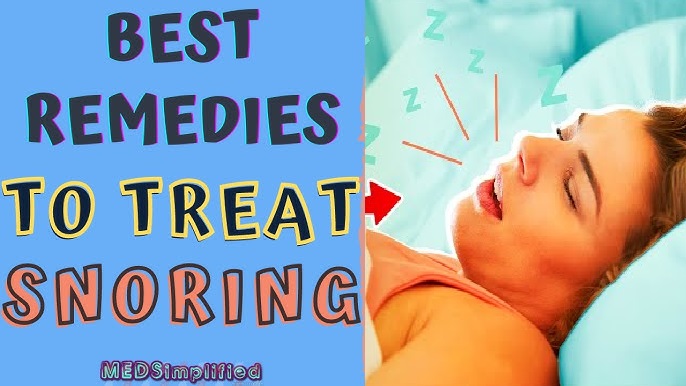Top 10 Best Ways to Stop Snoring – Natural & Effective Remedies
Snoring can disturb your sleep, affect your partner, and impact your daily energy. The good news? There are effective solutions. Whether you need the best way to stop snoring, the best solution for snoring, or the best way to eliminate snoring, this guide gives you proven, easy-to-follow steps.
⭐ Quick Summary: Best Ways to Stop Snoring
- Sleep on your side (best sleeping posture to avoid snoring)
- Lose extra weight
- Avoid alcohol and sedatives
- Use nasal strips or dilators
- Elevate your head
- Perform tongue and throat exercises
- Quit smoking
- Stay hydrated
- Try oral appliances (MAD, TRD, EPAP)
- Seek medical advice if needed
1. Change Your Sleeping Posture
Sleeping on your back is a major snoring trigger. The tongue falls backward and blocks airflow.
Switching to side sleeping is the best way to control snoring.
How to stay on your side:
- Positional therapy belts
- Side-sleeper pillows
- A tennis ball sewn into your shirt
This is the simplest sleeping posture to avoid snoring.
2. Lose Weight and Improve Lifestyle Habits
Extra neck fat narrows airways, making snoring louder.
Even a small weight loss can be the best way to cure snoring for many people.
Avoid before bed:
These weaken throat muscles and worsen snoring.
3. Use Nasal Strips, Dilators, or EPAP Devices
If nasal congestion is the issue, nasal strips or internal dilators can increase airflow.
EPAP devices like Provent or Bongo RX offer an advanced, non-invasive solution to snoring.
4. Try Oral Appliances (MADs and TRDs)
These devices help keep the airway open:
- MADs move your lower jaw forward
- TRDs hold your tongue in place
They are among the best ways to treat snoring, especially for chronic or loud snorers.
5. Do Tongue & Throat Exercises (Myofunctional Therapy)
Strengthening airway muscles reduces vibration during sleep.
Examples:
- Press your tongue against the roof of your mouth
- Slide your tongue backward and forward
- Repeat vowel exercises (A-E-I-O-U)
This method is a natural and effective best way to eliminate snoring.
6. Elevate Your Head While Sleeping
Raising your pillow by 4–6 inches improves airflow and reduces throat blockage.
Anti-snore pillows are specifically designed for alignment and airflow.
Good sleep hygiene supports this:
- Regular bedtime
- Dark, cool room
- Limited screen time before bed
This combination is a powerful best way to quit snoring naturally.
7. Stay Hydrated and Treat Allergies
When dehydrated, nasal and throat mucus thickens, increasing snoring.
Drink enough water throughout the day.
For allergies:
- Saline rinses
- HEPA air purifiers
- Antihistamines
These improve nasal breathing, making it one of the best ways to stop snoring.
8. Quit Smoking for Better Airflow
Smoking irritates and inflames airway tissues.
Quitting smoking significantly reduces snoring and improves lung health.
This is one of the fastest best solutions for snoring for smokers.
9. Try EPAP Systems or Custom Dental Devices
If basic solutions don’t work, try:
- EPAP devices (Provent, Bongo RX)
- Custom oral appliances made by dentists
These options help keep airways open without the need for bulky CPAP machines.
10. Seek Medical or Surgical Treatments When Needed
If snoring persists, consult a sleep specialist.
Advanced treatment options include:
- CPAP therapy (for sleep apnea)
- Laser-assisted uvulopalatoplasty
- Pillar procedure
- Somnoplasty
- Hypoglossal nerve stimulation
For severe cases, this becomes the best way to treat snoring.
Final Thoughts
Snoring doesn’t have to control your nights. By understanding your triggers and using these proven remedies, you can find the best way to stop snoring and enjoy peaceful, refreshing sleep again.
❓ FAQs: Best Way to Stop Snoring
1. What is the best way to stop snoring naturally?
Sleeping on your side, losing weight, and doing tongue exercises are the most effective natural remedies.
2. What is the best solution for snoring at night?
A combination of positional therapy, nasal strips, and oral appliances offers the best solution for most people.
3. What is the best way to quit snoring immediately?
Try elevating your head, clearing your nose, or using nasal dilators for instant relief.
4. Is there a best way to cure snoring permanently?
Lifestyle changes, weight loss, and myofunctional exercises offer long-term improvement. Severe cases may need medical treatment.
5. Does sleeping posture affect snoring?
Yes. Sleeping on your back worsens snoring. Side sleeping is the best posture to avoid snoring.
6. Can dehydration cause snoring?
Yes. Thick mucus increases snoring. Staying hydrated helps reduce airway blockage.
7. Are oral appliances effective?
Yes. MADs and TRDs are among the best ways to treat snoring for people with airway obstruction.
Home Remedies for Toothache
Dealing with a toothache can be quite uncomfortable, but several home remedies can offer relief. One effective method is rinsing your mouth with warm salt water, which can help reduce inflammation and clean the affected area. Applying a cold compress to the outside of your cheek may also numb the pain and reduce swelling. Additionally, clove oil, known for its natural analgesic properties, can be applied directly to the sore area for temporary relief. Garlic, with its antibacterial properties, is another home remedy for a toothache that may alleviate discomfort. While these remedies provide relief, it’s essential to consult a dentist for a proper diagnosis.





